Visiting scholars
 Senior researchers, post-doctoral and PhD researchers are invited to come and spend time at the Metaphor Lab through foreign visitor grant schemes. We are very interested in developing and submitting joint national or bilateral applications.
Senior researchers, post-doctoral and PhD researchers are invited to come and spend time at the Metaphor Lab through foreign visitor grant schemes. We are very interested in developing and submitting joint national or bilateral applications.
Find out what it is like to be a visiting scholar.
Giulia Frezza
July-November 2017
Giulia Frezza from Sapienza University, Rome spends four months at the Metaphor Lab to work on her research on the visitor project Resistance: Risk and Responsibility (ResRisRes). This project focuses on scientists’ awareness of and resistance to metaphor in responsible health communication, which is defined as scientists’ clear and audience tailored language use. Our objective is to shed light on the risk and responsibility involved in metaphor use in scientific discourse and the ways in which this can or should elicit resistance, the visitor adding a dedicated perspective from the history and philosophy of science. We distinguish between two complementary sides: a conceptual analysis of risk and responsibility entailed in metaphor use in scientific discourse, and its validation in an empirical study of how and why scientists resist metaphor. This will eventually open up new directions of research into how responsibility in health communication can be fostered, which is intended to lead to more extensive collaboration between the visitor and the host in a new Marie Curie-Sklodowska Individual Fellowship. This project will be applied for in the fall of 2017 with Dr. Giulia Frezza as main researcher and University of Amsterdam as Host Institution.
Allison Creed
June-November 2017
 Allison Creed is the Research Fellow for the Australian Collaboratory of Career, Employability, and Learning for Living (ACCELL) and Lecturer in Education at the University of Southern Queensland, Australia. She holds a PhD in Education and her field of research is metaphor in communication with a particular interest in inter-cultural and cross-cultural contexts of language use and learning. Her current research and further studies are in the field of Vocational Psychology. Allison has been a regular visitor to the Metaphor Lab over the past years for summer school and conference participation.
Allison Creed is the Research Fellow for the Australian Collaboratory of Career, Employability, and Learning for Living (ACCELL) and Lecturer in Education at the University of Southern Queensland, Australia. She holds a PhD in Education and her field of research is metaphor in communication with a particular interest in inter-cultural and cross-cultural contexts of language use and learning. Her current research and further studies are in the field of Vocational Psychology. Allison has been a regular visitor to the Metaphor Lab over the past years for summer school and conference participation.
Allison’s central research project is titled A-GRADES (Australian Graduates Employability Scale). This 12 month project aims to create a career development tool specific to the Australian higher education context and is designed for students and graduates, university personnel (e.g., career practitioners, work-integrated learning specialists), and researchers across academic fields. A key outcome of data collection during this project will be future research on narrative career identity. This will involve investigations into the role of narrative and metaphor in the composition and formation of individual career identity and will address narrative approaches to career counselling, assessment, and learning.
During her stay at the Metaphor Lab Amsterdam, Allison will develop her understanding of Deliberate Metaphor Theory and its practical application under the mentorship of her academic host Gerard Steen and through collaboration with Gudrun Reijnierse. In addition, she will extend her knowledge of Framing Theory and skills in performing a systematic review of literature—quantitative and qualitative studies—under the guidance of Christian Burgers to inform a grant application addressing health communication and metaphor in the context of nursing and nurse education.
Allison hopes that her visit and interaction with the Metaphor Lab Amsterdam team will strengthen existing connections and stimulate future cross-institutional collaboration between herself, ACCELL, and the Metaphor Lab Amsterdam. Allison’s stay at the Metaphor Lab Amsterdam is unfunded.
Maryam Saneie Moghadam
September 2016 – present
 I am a PhD student of applied linguistics in Tarbiat Modares University of Tehran. I do hold a deep interest in cognitive linguistics, metaphor theories and second language acquisition with a goal to devote my professional research carrier towards understanding the intricate dynamics of language, culture, and cognition. My PhD project mainly aims at presenting a comparative picture of forms and functions of metaphors in the written academic discourse of native and non-native speakers of English. During my stay at Metaphor Lab, I have mainly zoomed in on drafting the method chapter under the supervision of Gerard Steen. Highly interactive research environment of Metaphor Lab provided me with both the opportunity to work toward the completion of data collection and data analysis of my project and a better grasp of the most fundamental aspects of metaphor research and cognitive linguistics.
I am a PhD student of applied linguistics in Tarbiat Modares University of Tehran. I do hold a deep interest in cognitive linguistics, metaphor theories and second language acquisition with a goal to devote my professional research carrier towards understanding the intricate dynamics of language, culture, and cognition. My PhD project mainly aims at presenting a comparative picture of forms and functions of metaphors in the written academic discourse of native and non-native speakers of English. During my stay at Metaphor Lab, I have mainly zoomed in on drafting the method chapter under the supervision of Gerard Steen. Highly interactive research environment of Metaphor Lab provided me with both the opportunity to work toward the completion of data collection and data analysis of my project and a better grasp of the most fundamental aspects of metaphor research and cognitive linguistics.
Past visiting scholars
Chiara Ferella
March 2017
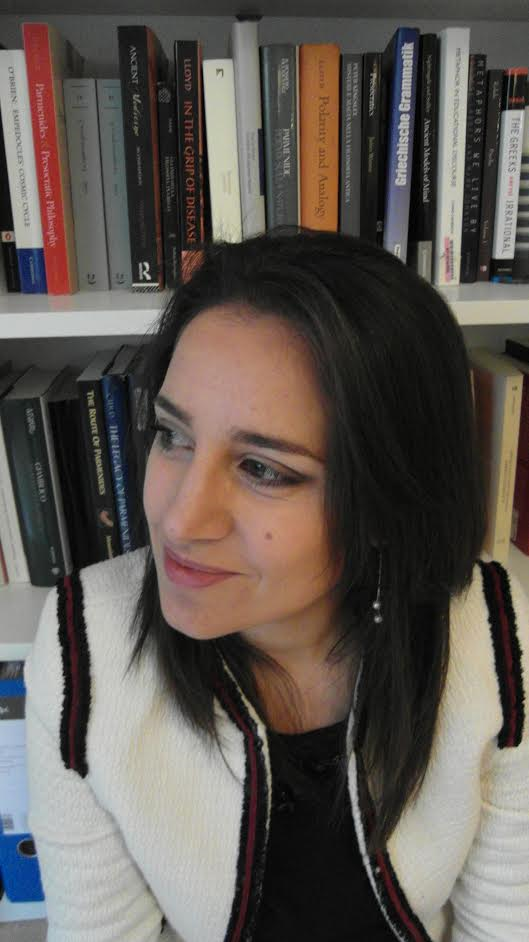 Chiara Ferella studied Classics at the Universities of L’Aquila (Italy), Cambridge, Pisa and Munich. Since 2015 she is a post-doc Fellow at the Excellence Cluster Topoi in Berlin, within the Research Group C-2 “Space and metaphor in cognition, language, and texts”. Since October 2016, she has been visiting lecturer of Greek Philology at the Free University of Berlin. Her research interests focus above all on ancient Greek philosophy, literature and religion and she has published especially on pre-Socratics and Orphisms. At the present, she is working on a new project on the religious and historical relevance of the literary form of the Pythagorean symbola and, above all, on metaphor as a mode of argumentation in early Greek philosophy.
Chiara Ferella studied Classics at the Universities of L’Aquila (Italy), Cambridge, Pisa and Munich. Since 2015 she is a post-doc Fellow at the Excellence Cluster Topoi in Berlin, within the Research Group C-2 “Space and metaphor in cognition, language, and texts”. Since October 2016, she has been visiting lecturer of Greek Philology at the Free University of Berlin. Her research interests focus above all on ancient Greek philosophy, literature and religion and she has published especially on pre-Socratics and Orphisms. At the present, she is working on a new project on the religious and historical relevance of the literary form of the Pythagorean symbola and, above all, on metaphor as a mode of argumentation in early Greek philosophy.
Giulia Frezza
November 2016
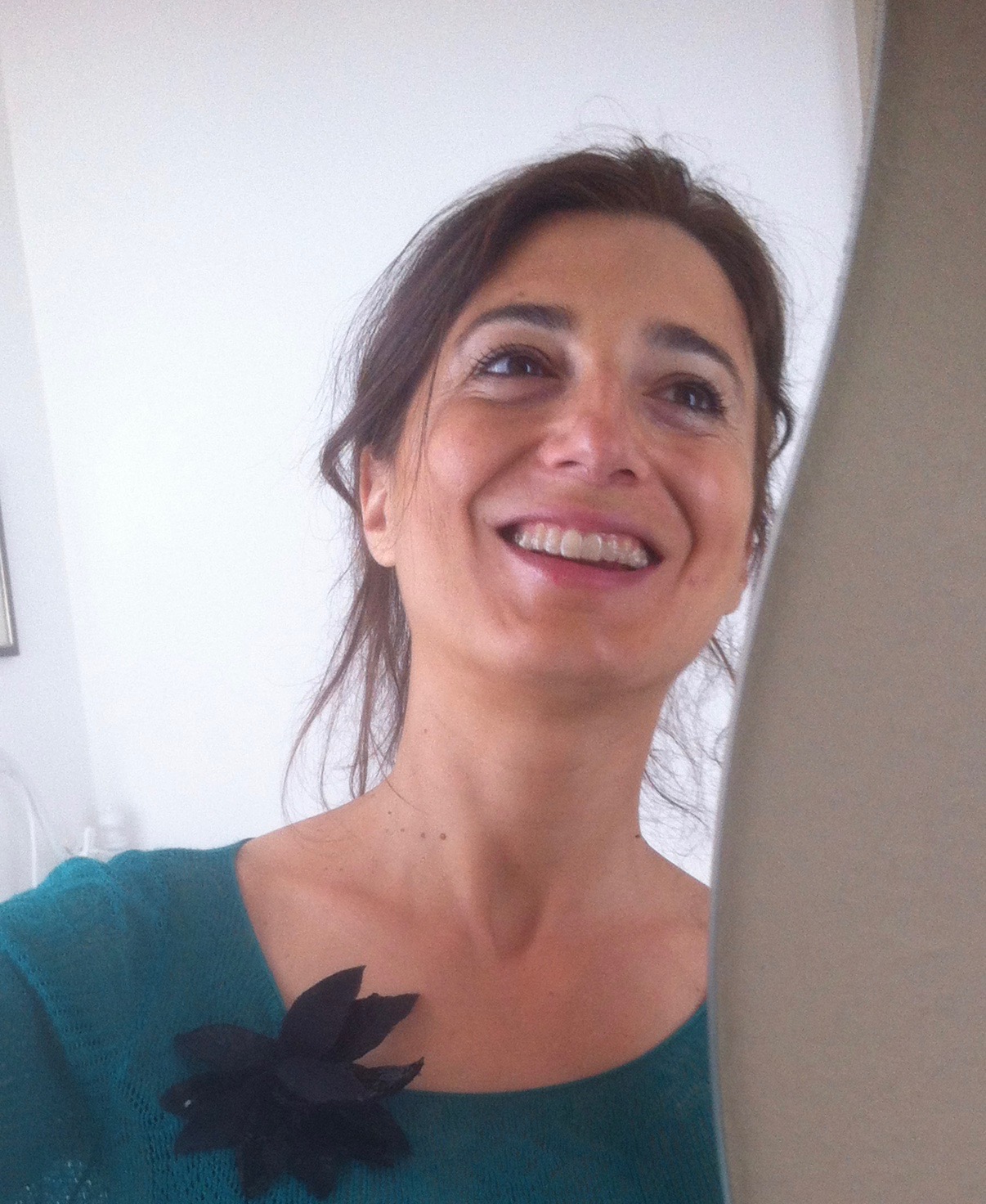 Giulia Frezza is a postdoctoral fellow and lecturer of History of Medicine at Sapienza-University of Rome. She holds a PhD in Philosophy and Epistemology-History of Science at the University of Rome TRE and Université Denis-Diderot Paris VII. Her field of research is History and Philosophy of Biomedical Sciences. She organizes unconventional popular science events for the European Researchers Night and Bologna Medicine Festival. She stayed at the Metaphor Lab to present ‘Risk and responsibility: Metaphors in health communication’, discussing the ’gene-editing’ metaphor and the case of CRISPR-Cas genome editing technique (8 November). During her stay, she also set-up the NWO Visiting Project ResRisRes (Resistance: Risk and Responsibility) together with Gerard Steen and Jean Wagemans, focusing on scientists’ awareness of and resistance to metaphor in responsible health communication.
Giulia Frezza is a postdoctoral fellow and lecturer of History of Medicine at Sapienza-University of Rome. She holds a PhD in Philosophy and Epistemology-History of Science at the University of Rome TRE and Université Denis-Diderot Paris VII. Her field of research is History and Philosophy of Biomedical Sciences. She organizes unconventional popular science events for the European Researchers Night and Bologna Medicine Festival. She stayed at the Metaphor Lab to present ‘Risk and responsibility: Metaphors in health communication’, discussing the ’gene-editing’ metaphor and the case of CRISPR-Cas genome editing technique (8 November). During her stay, she also set-up the NWO Visiting Project ResRisRes (Resistance: Risk and Responsibility) together with Gerard Steen and Jean Wagemans, focusing on scientists’ awareness of and resistance to metaphor in responsible health communication.
Mikael Skagenholt
January – June 2016
 I am a student at the research master’s programme in Brain and Cognitive Sciences, University of Amsterdam (BSc in Cognitive Science from Linköping University, Sweden, 2014). I was first exposed to conceptual metaphor theory during my bachelor’s thesis, where I investigated the neural and conceptual basis of numerical cognition, which spurred a continued interest in the interaction of language, perception, meaning, and cognition.
I am a student at the research master’s programme in Brain and Cognitive Sciences, University of Amsterdam (BSc in Cognitive Science from Linköping University, Sweden, 2014). I was first exposed to conceptual metaphor theory during my bachelor’s thesis, where I investigated the neural and conceptual basis of numerical cognition, which spurred a continued interest in the interaction of language, perception, meaning, and cognition.Zaga Vuckovic (University of Belgrade, Serbia)
May 2016
 I am a master student at the Faculty of Philology, University of Belgrade. As I am greatly interested in metaphors that emerge in actual language use, I decided to visit the Metaphor Lab Amsterdam in order to acquire deeper knowledge about the field. During my one-month stay at the Lab, thanks to the help of Gerard Steen, I became thoroughly familiar with the MIPVU, an explicit and systematic method for linguistic metaphor identification in language usage. I subsequently applied the procedure to several scientific texts, which is the first step of my research that aims at investigating the differences and similarities in the use of metaphorical expressions between scholarly peer-reviewed journals written by and for experts and popular science magazines written by journalists for the general public. I hope to account for the variations in the use of metaphors in terms of genre (discourse community, purpose, staging) and register (field, tenor, mode), a design proposed by Deignan, Littlemore, and Semino (2013).
I am a master student at the Faculty of Philology, University of Belgrade. As I am greatly interested in metaphors that emerge in actual language use, I decided to visit the Metaphor Lab Amsterdam in order to acquire deeper knowledge about the field. During my one-month stay at the Lab, thanks to the help of Gerard Steen, I became thoroughly familiar with the MIPVU, an explicit and systematic method for linguistic metaphor identification in language usage. I subsequently applied the procedure to several scientific texts, which is the first step of my research that aims at investigating the differences and similarities in the use of metaphorical expressions between scholarly peer-reviewed journals written by and for experts and popular science magazines written by journalists for the general public. I hope to account for the variations in the use of metaphors in terms of genre (discourse community, purpose, staging) and register (field, tenor, mode), a design proposed by Deignan, Littlemore, and Semino (2013).
In addition, the time I spent at the Metaphor Lab helped me sharpen my research skills and gain insight into current metaphor research, which is of great importance for my future work.
Francesca Strik Lievers (University of Pisa)
February – March 2016
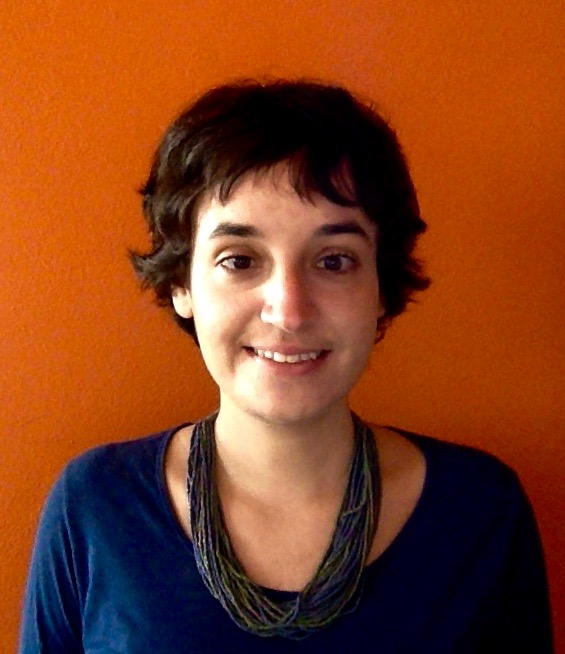 My research focuses on linguistic synaesthesia, a type of metaphor generated by the association of linguistic expressions referring to different sensory modalities. For instance, sweet melody is a case of ‘taste to hearing’ metaphoric transfer, the noun melody being the target of the synaesthetic use of the adjective sweet. On the one hand, I have tried to provide a clear and theoretically satisfying definition of synaesthesia vis-à-vis other figures. On the other hand, I have conducted a corpus-based study aimed at verifying what has been suggested in previous literature concerning sensory associations in synaesthesia, that is, that transfers tend to go from the so-called lower senses (touch, taste, smell) to the higher senses (hearing and sight) (cf. sweet melody vs. melodious sweetness).
My research focuses on linguistic synaesthesia, a type of metaphor generated by the association of linguistic expressions referring to different sensory modalities. For instance, sweet melody is a case of ‘taste to hearing’ metaphoric transfer, the noun melody being the target of the synaesthetic use of the adjective sweet. On the one hand, I have tried to provide a clear and theoretically satisfying definition of synaesthesia vis-à-vis other figures. On the other hand, I have conducted a corpus-based study aimed at verifying what has been suggested in previous literature concerning sensory associations in synaesthesia, that is, that transfers tend to go from the so-called lower senses (touch, taste, smell) to the higher senses (hearing and sight) (cf. sweet melody vs. melodious sweetness).
During my stay at the Metaphor Lab, I had the opportunity to discuss my work, receiving useful feedback. At the same time, I gained new insights into current topics in metaphor research, which will inform future development of my study. Moreover, I started collaborating with Dr Marianna Bolognesi: together, we are working on a project on visual synaesthesia in print advertising, to be presented at Metaphor Festival 2016.
Kristina Despot
January 2016
 My research stay at the Metaphor Lab Amsterdam was funded by the Croatian Science Foundation under the project Croatian Metaphor Repository, at which I am a principal investigator. This project combines a theory-driven introspective top-down approach that analyzes the system of conceptual metaphors in the Croatian language (following the methodology of the International Computer Science Institute’s project MetaNet: A Multilingual Metaphor Repository), with a bottom-up corpus based approach that analyzes how metaphors are used in discourse. The main result of the project is a figurative language database ‒ MetaNet.HR (http://ihjj.hr/metafore/). It lists conceptual metaphors and metonymies decomposed into source-target relations among cognitive primitives, image schemas, and semantic frames, which are further decomposed into semantic roles. Bottom-up approach within the project (detection of linguistic metaphors and corpus annotation) relies strongly on the Metaphor Identification Procedure VU University Amsterdam. Therefore, the main purpose of my research visit was to discuss, refine and define all the steps of the linguistic metaphors identification procedure performed within the project with the aim for the database to reflect not only the intuition and knowledge of the researchers but also the (corpus) reality of the Croatian language.
My research stay at the Metaphor Lab Amsterdam was funded by the Croatian Science Foundation under the project Croatian Metaphor Repository, at which I am a principal investigator. This project combines a theory-driven introspective top-down approach that analyzes the system of conceptual metaphors in the Croatian language (following the methodology of the International Computer Science Institute’s project MetaNet: A Multilingual Metaphor Repository), with a bottom-up corpus based approach that analyzes how metaphors are used in discourse. The main result of the project is a figurative language database ‒ MetaNet.HR (http://ihjj.hr/metafore/). It lists conceptual metaphors and metonymies decomposed into source-target relations among cognitive primitives, image schemas, and semantic frames, which are further decomposed into semantic roles. Bottom-up approach within the project (detection of linguistic metaphors and corpus annotation) relies strongly on the Metaphor Identification Procedure VU University Amsterdam. Therefore, the main purpose of my research visit was to discuss, refine and define all the steps of the linguistic metaphors identification procedure performed within the project with the aim for the database to reflect not only the intuition and knowledge of the researchers but also the (corpus) reality of the Croatian language.
The research visit was a rewarding one both in terms of extremely valuable feedback from Gerard Steen and the Metaphor Lab research team and in terms of establishing stronger and hopefully long-term connections between our two research groups.
Zhen Pan (Jiangsu Normal University, China)
October 2015 – April 2016
 My research takes a multidisciplinary approach to emotions, integrates the findings of different disciplines of cognitive linguistics, sociology, psychology and culture, and describes the role of metaphors in the conceptualization of emotions. It analyzes the linguistic expressions of emotions (like happiness, anger, sadness, love, desire and so on) both in Chinese and English, with traditional and modern Chinese and English novels and poems as data. Meanwhile, I will compare and contrast the Chinese and English styles of emotional transmission together with their cognitive, psychological and cultural motives. Besides, I try to identify the various emotional constructions, and find out how metaphors work in the constructing processes of these emotional constructions. My research aims at the deeper understanding of metaphors in emotional languages and the comprehensive construction of emotional culture systems.
My research takes a multidisciplinary approach to emotions, integrates the findings of different disciplines of cognitive linguistics, sociology, psychology and culture, and describes the role of metaphors in the conceptualization of emotions. It analyzes the linguistic expressions of emotions (like happiness, anger, sadness, love, desire and so on) both in Chinese and English, with traditional and modern Chinese and English novels and poems as data. Meanwhile, I will compare and contrast the Chinese and English styles of emotional transmission together with their cognitive, psychological and cultural motives. Besides, I try to identify the various emotional constructions, and find out how metaphors work in the constructing processes of these emotional constructions. My research aims at the deeper understanding of metaphors in emotional languages and the comprehensive construction of emotional culture systems.
Valentina Cuccio (University of Palermo, Italy)
September 2015 – December 2015
 The Metaphor Lab Amsterdam was awarded a four month visitor grant by NWO for a joint project between Valentina Cuccio, University of Palermo, and Gerard Steen. The objective of the visit is to bring together Steen’s three-dimensional theory of metaphor with innovative insights about the embodied nature of figurative language processing from cognitive neuro science developed by visiting researcher Cuccio. The project aims to develop a novel definition of Embodied Simulation that shows how the body plays a direct role in the initial stages of language comprehension, with a special focus on the area of metaphor comprehension. It also aims to review contrasting findings in embodied language processing research on metaphor comprehension from this new Embodied Simulation perspective and explain apparent incongruities by exploiting Steen’s distinction between deliberate and non-deliberate metaphor.
The Metaphor Lab Amsterdam was awarded a four month visitor grant by NWO for a joint project between Valentina Cuccio, University of Palermo, and Gerard Steen. The objective of the visit is to bring together Steen’s three-dimensional theory of metaphor with innovative insights about the embodied nature of figurative language processing from cognitive neuro science developed by visiting researcher Cuccio. The project aims to develop a novel definition of Embodied Simulation that shows how the body plays a direct role in the initial stages of language comprehension, with a special focus on the area of metaphor comprehension. It also aims to review contrasting findings in embodied language processing research on metaphor comprehension from this new Embodied Simulation perspective and explain apparent incongruities by exploiting Steen’s distinction between deliberate and non-deliberate metaphor.
Luzia Goldmann (University of Cologne, Germany)
September 2015 – December 2015
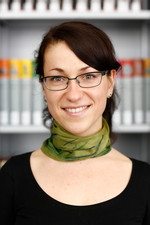 The PhD-project “Transfigurations of Metaphor” aims to investigate the explanatory and interpretative potential that contemporary cognitive approaches to metaphor can offer to the research in literary studies. The project is designed as a twofold attempt that takes into account the historical background of the different metaphor theories that are rooted in their contemporary philosophical, linguistic and religious background as well as a systematic perspective on recurring elements and continuous developments of assumptions, arguments and perspectives on metaphor throughout the centuries. During my stay in the Metaphor Lab I aim to gain a better understanding of the scope of current metaphor theories outside the field of literary studies and in how far these different approaches might offer fruitful inspirations for my own field.
The PhD-project “Transfigurations of Metaphor” aims to investigate the explanatory and interpretative potential that contemporary cognitive approaches to metaphor can offer to the research in literary studies. The project is designed as a twofold attempt that takes into account the historical background of the different metaphor theories that are rooted in their contemporary philosophical, linguistic and religious background as well as a systematic perspective on recurring elements and continuous developments of assumptions, arguments and perspectives on metaphor throughout the centuries. During my stay in the Metaphor Lab I aim to gain a better understanding of the scope of current metaphor theories outside the field of literary studies and in how far these different approaches might offer fruitful inspirations for my own field.
Sıla Gen (Cukurova University, Turkey)
March 2014 – February 2015
 I am writing a PhD thesis on “Metaphors in Uzbek” at Cukurova University. I examine metaphors in modern Uzbek literary texts and classify them into orientational, ontological and structural metaphors. My data consists of literary texts, including novels, poems and short stories.
I am writing a PhD thesis on “Metaphors in Uzbek” at Cukurova University. I examine metaphors in modern Uzbek literary texts and classify them into orientational, ontological and structural metaphors. My data consists of literary texts, including novels, poems and short stories.
The research questions my study aims to answer are:
*What kind of metaphorical expressions occur in Uzbek literature, and what do these expressions indicate about the conceptualization of the target domains?
*What kind of everyday and literary metaphors do Uzbek literary texts contain?
*What can the metaphorical language in these literary text teach us about Uzbek culture?
My analysis is grounded on a cognitive linguistic approach and will be used to form an empirically motivated frame to describe the use of metaphor in Uzbek. During my research at VU Amsterdam, I would like to apply the MIPVU procedure to my data. I believe my time with the Metaphor Lab will help me to apply the MIPVU procedure more consistently, which will improve the quality of my research.
Paula Pérez Sobrino (University of La Rioja, Spain)
September 2014 – January 2015
 My dissertation (to be submitted at the end of 2014) explores the potentiality of metaphor to couple with other conceptual operations (namely metonymy and other metaphors) in multimodal settings. This project adopts approaches and techniques from cognitive linguistics, corpus linguistics, cognitive and social psychology, and marketing.
My dissertation (to be submitted at the end of 2014) explores the potentiality of metaphor to couple with other conceptual operations (namely metonymy and other metaphors) in multimodal settings. This project adopts approaches and techniques from cognitive linguistics, corpus linguistics, cognitive and social psychology, and marketing.
My key research questions are:
– How does multimodal metaphor interact with other conceptual operations in advertising, such as metonymy and other metaphors?
– How can conceptual complexity (arising from the interaction of metaphor with other tropes) be measured?
– Is (and if so, how) conceptual complexity in advertising related to other factors, such as the marketing strategy behind the promotion of the product?
– Is (and if so, how) conceptual complexity in advertising related to the speed and depth of comprehension by consumers, and to the perceived appeal of the advertisement with metaphoric and metonymic content?
During my stay at the Metaphor Lab, I’ll be jointly working with Dr. Marianna Bolognessi and Romy van den Heerik in the annotation of the visual metaphors (and other tropes, if existent) in Vismet Baby (http://metaphorlab.org/VisMet/index.php) as part of the Vismet Project, the first open online resource of images annotated for metaphor.
Anna Plater-Zyberk (Jagiellonian University, Poland)
August 2014 – January 2015
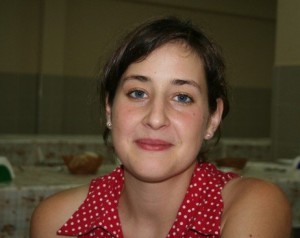 I am a PhD student at Jagiellonian University, Krakow. My project entitled “As Through a Looking Glass. Comparative analysis of metaphorical expressions, with reference to the Polish post-communist screening process” grew out of my interests in conceptual metaphor theory combined with my concern with language representation of political discourse.
I am a PhD student at Jagiellonian University, Krakow. My project entitled “As Through a Looking Glass. Comparative analysis of metaphorical expressions, with reference to the Polish post-communist screening process” grew out of my interests in conceptual metaphor theory combined with my concern with language representation of political discourse.
According to the cognitive metaphor theory, metaphorical expressions are mental constructs which shape our understanding of the world. As an abstract concept, the post-communist screening process is presented in press articles through a variety of cognitive models. I consider that metaphorical expressions used to present this social phenomenon in ideologically opposed newspapers will reveal different mental images and different aspects of the post-communist screening process, thereby creating diverse models of reality and axiology. My key research questions are thereby the following:
– Does ideology influence metaphor use?
– Do metaphors differ depending on the source, and if so how do they differ?
– Do these metaphors create a consistent conceptualisation of the screening process?
– What are the input domains? And what are the relations between input domains, axiological charge and semantic roles?
My research stay at the Vrije Universiteit Amsterdam is a great opportunity, enabling me to carry out my research while drawing on the stimulating environment of the Metaphor Lab. During the next five months I would like to apply the MIPVU procedure to my corpus of texts and consult some methodological issues with the metaphor identification process. I am convinced that my research stay in Amsterdam will provide me with an invaluable insight into current metaphor research.
Dalby Dienstbach Hubert (Fluminense Federal University, Brazil)
November 2013 – August 2014
 Based on a sociocognitive approach to language and, in particular, to metaphor, my project focuses its attention upon possible articulations between the nature of metaphor and the nature of discourse genres. More specifically, my chief inquiry is, in this sense, to propose and explore systematic (and mutually determining) relationships between the degree of metaphoricity of figurative language in particular texts and aspects of the type of discourse which these texts identify with. The relationships I intend to explore refer to the effects of the salience of figurative language on our implicit knowledge (i.e. the frame) of a discourse genre, as well as to the effects of this knowledge on salience of metaphor. I conduct my investigation on the basis of the following hypothesis: (i) aspects of the frame of a genre determine the degree of metaphoricity of figurative language in respective particular texts; and (ii) the degree of metaphoricity typical of a certain type of discourse plays a significant role in the formation of the frame of its genre. I ground my analysis on the concept of metaphoricty as a context-dependent feature (cf. Goatly 1997, Cameron 2003, and Müller 2008); and on the notion of genre as frame (i.e. an abstract system of interrelated prototypical elements) (cf. Fillmore 1982, Paltridge 1995, Steen 1999, and Bhatia 2004). As a visiting research student at the VU University Amsterdam, I will then be collecting and analyzing data in corpora identified with four different genres, by means of identification of metaphorical expressions in the texts, assessment of their degree of metaphoricity, and comparison of these data between those genres.
Based on a sociocognitive approach to language and, in particular, to metaphor, my project focuses its attention upon possible articulations between the nature of metaphor and the nature of discourse genres. More specifically, my chief inquiry is, in this sense, to propose and explore systematic (and mutually determining) relationships between the degree of metaphoricity of figurative language in particular texts and aspects of the type of discourse which these texts identify with. The relationships I intend to explore refer to the effects of the salience of figurative language on our implicit knowledge (i.e. the frame) of a discourse genre, as well as to the effects of this knowledge on salience of metaphor. I conduct my investigation on the basis of the following hypothesis: (i) aspects of the frame of a genre determine the degree of metaphoricity of figurative language in respective particular texts; and (ii) the degree of metaphoricity typical of a certain type of discourse plays a significant role in the formation of the frame of its genre. I ground my analysis on the concept of metaphoricty as a context-dependent feature (cf. Goatly 1997, Cameron 2003, and Müller 2008); and on the notion of genre as frame (i.e. an abstract system of interrelated prototypical elements) (cf. Fillmore 1982, Paltridge 1995, Steen 1999, and Bhatia 2004). As a visiting research student at the VU University Amsterdam, I will then be collecting and analyzing data in corpora identified with four different genres, by means of identification of metaphorical expressions in the texts, assessment of their degree of metaphoricity, and comparison of these data between those genres.
Isabel Negro (Complutense University of Madrid)
June 2013
 Metaphor has been vastly researched in the last decades. Although the bulk of investigations have focused on linguistic metaphor, other types of metaphor such as visual and multimodal metaphor have attracted much scholarly attention in recent years. Many studies carried out from a cognitive perspective have been concerned with the conceptual metaphors underlying images and the role of metaphor in meaning construction. My research into multimodal metaphor in advertisements, cartoons and newspaper covers lies within this scope. In contrast, little attention has been paid to the process whereby metaphor is derived from image. During my internship at VU University Amsterdam, I would like to apply the VISMIP procedure for a more systematic and reliable identification of visual metaphor in a sample of ads. I believe that my empirical work will benefit from this consistent approach to visual metaphor.
Metaphor has been vastly researched in the last decades. Although the bulk of investigations have focused on linguistic metaphor, other types of metaphor such as visual and multimodal metaphor have attracted much scholarly attention in recent years. Many studies carried out from a cognitive perspective have been concerned with the conceptual metaphors underlying images and the role of metaphor in meaning construction. My research into multimodal metaphor in advertisements, cartoons and newspaper covers lies within this scope. In contrast, little attention has been paid to the process whereby metaphor is derived from image. During my internship at VU University Amsterdam, I would like to apply the VISMIP procedure for a more systematic and reliable identification of visual metaphor in a sample of ads. I believe that my empirical work will benefit from this consistent approach to visual metaphor.
Su’ad Awab (Faculty of Languages & Linguistics, University of Malaya)
December 2012 – August 2013
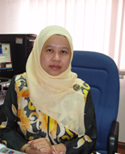 The study of metaphors in the Malay language has traditionally focused on literary texts, hence the metaphorical representation of the Malay world view is still locked in the realm of anatomy (Asmah 1996), agriculture and nature (Sufian 2004). In a comparative study of metaphors used in Malay and English newspapers to report the 2008 economic crisis (Awab & Norazit 2011), a revealing picture shows differences in the presentation and analysis of the same event as it targets bi-lingual speakers. Depending on which language the reporting is made in, the same audience is presented with the different views adopted by each newspaper as they differentially propagate a prescribed political stance in support of the resultant policy decision. For example, the English language newspaper was more likely to present the crisis as an ‘act of nature’, i.e. an event that was unavoidable, while the Malay language newspaper presented it as an ‘act of war’, in other words there was an external ‘other’ to blame for the current situation. However, in both instances what is required of the reader is to support the government in its attempts to overcome the crisis.
The study of metaphors in the Malay language has traditionally focused on literary texts, hence the metaphorical representation of the Malay world view is still locked in the realm of anatomy (Asmah 1996), agriculture and nature (Sufian 2004). In a comparative study of metaphors used in Malay and English newspapers to report the 2008 economic crisis (Awab & Norazit 2011), a revealing picture shows differences in the presentation and analysis of the same event as it targets bi-lingual speakers. Depending on which language the reporting is made in, the same audience is presented with the different views adopted by each newspaper as they differentially propagate a prescribed political stance in support of the resultant policy decision. For example, the English language newspaper was more likely to present the crisis as an ‘act of nature’, i.e. an event that was unavoidable, while the Malay language newspaper presented it as an ‘act of war’, in other words there was an external ‘other’ to blame for the current situation. However, in both instances what is required of the reader is to support the government in its attempts to overcome the crisis.
As Malay, an SOV language, shares many syntactic similarities with English, I am keen to apply the MIPVU for a more systematic identification based on empirical evidence afforded through corpus linguistics.
In addition, I would also like to work on a corpus of brochures related to cancer which I collected and am studying in my current project entitled “Print Media Presentation of Breast Cancer Awareness, Risks and Treatment: Readability, Suitability and Comprehensibility”. It is opportune that the MIPVU is now being extended from identifying textual metaphors to visual metaphors, which are abundant in brochures.
Marta Borges (Autonomous University of Madrid)
January 2013 – April 2013
 I am a PhD student at the Autonomous University of Madrid. My dissertation is about the expression of illness in Moroccan Arabic, a spoken language used by native (Morocco’s Arabs) and non-native speakers (Morocco’s Berbers). My corpus is exclusively oral and it comprises open interviews with Moroccans, and TV and radio programs about illness. Some of my research questions are:
I am a PhD student at the Autonomous University of Madrid. My dissertation is about the expression of illness in Moroccan Arabic, a spoken language used by native (Morocco’s Arabs) and non-native speakers (Morocco’s Berbers). My corpus is exclusively oral and it comprises open interviews with Moroccans, and TV and radio programs about illness. Some of my research questions are:
– How is illness and its progression expressed metaphorically?
– Are different metaphors used for talking about different kinds of illnesses?
During my internship at VU University Amsterdam, I would like to apply the MIPVU procedure for systematic identification of metaphor to my data. The application of MIPVU to spoken Moroccan Arabic is challenging. For example, the notion of ‘lexical unit’ cannot be easily transferred. Moreover, the absence of a monolingual dictionary requires further adaptations of the MIPVU methodology for its application to Moroccan Arabic.
